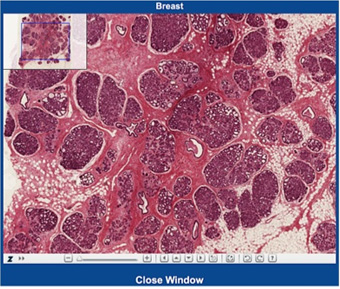 Never jump right in with high power. Never jump right in with high power.
An initial scan of the entire slide is necessary for you to obtain
the big picture without missing anything important.
-
It is important to observe not
only cells but also any other tissue components that may be
present.
- Also, it is essential for you to
develop an integrated study strategy
that combines recognizing structures with knowledge of their
function. Understanding structure-function relationships is
fundamental to your study of physiology and pathology in the
UDOS courses.
Approach
the slide, either glass or virtual, like an aerial view. Cruise and
see the whole landscape before trying a landing.
-
 For the virtual slides, start on
the lowest power and get the feeling for the whole tissue. For the virtual slides, start on
the lowest power and get the feeling for the whole tissue.
- The image to the right shows a
smaller image in the upper left that is the tissue as it
appeared on the glass slide the VM slide was made from.
- The little blue box shows the
field of view in the larger frame. You may need to adjust the
slide-bar at the bottom of the main window to back the
magnification off to its minimum.
- Once you've gotten the lay of
the 'lay of the land', then increase the magnification in the
areas of interest.
Slide preparation. |